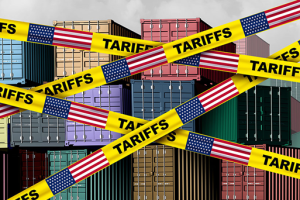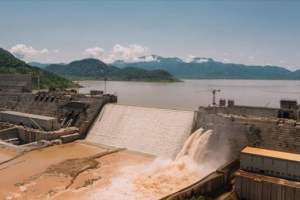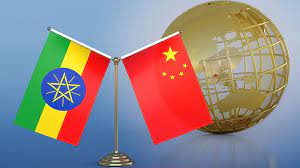
Ethiopia is championing for the fair and equal utilization of Nile River waters, as it deems it to be a crucial step in revolutionizing the ties between countries residing along the river. Instead of creating an atmosphere of unease and discord, Ethiopia is hoping to foment cooperation and collaboration among riparian nations.
Ethiopia views the equitable utilization of the Nile River as a solution to a long-standing conflict among countries that depend on it. Rather than exerting dominance over the river and its resources, Ethiopia intends to be at the forefront of creating a win-win situation for all riparian countries. This kind of approach aims to establish harmony, respect and foster mutual growth and development in the region.
The country is building the Grand Ethiopian Renaissance Dam (GERD) on the Nile which aims to produce electricity and benefit the region. This project looks to promote water utilization in a fair and sustainable manner and will establish a new paradigm for the equitable use of the Nile.
Ethiopia’s approach towards the Nile River is grounded in the principles of cooperation and mutual benefit. Ethiopia is seeking to redefine the conversation regarding water usage, away from a confrontational approach, toward a more amicable and collaborative approach that prioritizes the wellbeing and prosperity of all countries along the Nile.
In the past, there were misunderstandings between countries regarding the use of the Nile waters. Ethiopia’s approach is a paradigm shift from this kind of thinking towards a more solution-oriented approach that prioritizes the importance of each country’s development.
Ethiopia is prioritizing peaceful coexistence, cooperation, and mutual benefit in the Nile River basin nations. By emphasizing equity and fairness, Ethiopia is shifting the conversation and priorities for Nile nations, aiming to create long-lasting peace and prosperity for the still developing region. The underlying motivation behind Ethiopia’s drive for an equitable usage of the Nile River’s resources is the realization of the transformational possibilities of the river.
Ethiopia acknowledges that effective management of these resources will foster the socio-economic development of countries along the river. As such, Ethiopia is prioritizing an approach that will contribute to the shared growth and prosperity of all riparian nations. Through its recognition of the transformative power of the Nile River, Ethiopia is promoting a shift in mindset from competition and mistrust to cooperation and mutual benefit.
This approach involves the creation of an environment in which every riparian nation can benefit from the river’s resources, and none are left behind. Ethiopia acknowledges that achieving this goal will require a significant change in attitude and approach to water resource management. Ethiopia’s emphasis on inclusivity and collaboration is due to the recognition that no country should exploit the Nile’s resources solely for its benefit.
Ethiopia is seeking to prevent the exploitation of the river, which can lead to negative consequences such as environmental degradation, reduced productivity, and prolonged conflicts. Instead, Ethiopia is prioritizing an approach that is anchored in mutual benefit and the creation of a shared vision. The push for inclusivity and shared vision is reflected in Ethiopia’s approach to the GERD project, which seeks to harness the Nile River’s resources to produce sustainable energy.
The integrated approach is key in the equitable distribution of water resources, regulation of water usage, and prevention of over-exploitation, among other benefits. Ethiopia believes the adoption of this approach can promote mutual benefit by ensuring water resources are available for all users. Ethiopia recognizes that mistrust and competition among riparian nations can hinder water resource management and usage. Thus, Ethiopia is advocating for cooperation and dialogue among countries along the Nile, including through initiatives such as the Nile Basin Initiative.
The initiative fosters integrated water resource management and supports the development of legal frameworks to enable the equitable sharing of the Nile’s resources. In addition to the Nile Basin Initiative, Ethiopia has also made significant investments in irrigation infrastructure to enable efficient water resource utilization and improve agricultural productivity.
By investing in infrastructure development, Ethiopia is looking to create an environment that will support the growth and development of all countries along the river. The push for equitable utilization of Nile waters is a long-term endeavor that requires the involvement of all countries along the river. Ethiopia is calling for a joint approach that prioritizes collaboration, inclusivity, and mutual benefit. Such an approach will not only foster socio-economic development but also create an environment of peace and stability, conducive to the growth of the region.
The push for fair utilization of Nile waters transcends individual interests or national boundaries. Ethiopia is calling for a shift in attitude and approach to water resource management for the benefit of all riparian nations. By embracing inclusivity, collaboration, and the creation of shared visions, Ethiopia is looking to transform the Nile basin region. This transformation will not only see socio-economic growth but will also promote regional stability and sustainable development.
The country is aware of the history of conflict and disagreement that has characterized the relationship between countries residing along the Nile Basin. Despite this history, Ethiopia is committed to breaking free from this cycle of mistrust and competition. The country believes that by prioritizing collaborative efforts, countries in the Nile Basin region can achieve shared prosperity and development. Ethiopia understands that mistrust and competition among Nile Basin countries have been significant hindrances to regional stability and development. However, Ethiopia is determined to forge a new path – one that emphasizes the possibilities of collaboration and partnership among all Nile Basin countries.
Ethiopia recognizes that the journey towards shared prosperity may not be an easy path. Still, the country is steadfast in its belief that this approach will ultimately lead to sustainable growth and development in the region. The country acknowledges that a spirit of partnership and collaboration among countries is necessary for achieving shared prosperity in the Nile Basin. Despite the historical tensions, Ethiopia understands that there is a critical need to overcome these hurdles and to work together towards a shared vision.
Ethiopia’s regional leadership in the Nile Basin stems from its proactive approach towards regional challenges. The country has shown a deep commitment to addressing the region’s development challenges by investing in infrastructure development, social services, and other critical areas. Ethiopia’s investments in the region’s development are aimed at creating a space for shared growth and development among all Nile Basin countries.
Ethiopia is committed to playing a leading role in fostering a new way of thinking towards collaborative Nile Basin management, aimed towards creating a brighter future for the region and its people. One of Ethiopia’s primary objectives in emphasizing the fair utilization of Nile waters is to ensure that all riparian nations’ needs and aspirations are taken into account. Ethiopia is aware that different countries may have varying interests, but the country believes that open dialogue and empathy are crucial steps towards finding common ground.
The importance of fair utilization of Nile waters is central in ensuring sustainable development in the region. Ethiopia understands that the misuse and over-exploitation of Nile waters could lead to negative consequences. Ethiopia is thus advocating for collaborative management of water resources to ensure their equitable utilization and safeguard against environmental degradation.
As such, Ethiopia is committed to fostering regional cooperation to realize these benefits, a goal that requires the fair utilization of Nile waters. Ethiopia recognizes the importance of fair utilization of Nile waters, which requires a collaborative approach based on open dialogue and empathy. Ethiopia acknowledges the need for a shared vision and legal frameworks to guide water resource management and promote shared economic growth and development.
In promoting the fair utilization of Nile waters, Ethiopia also seeks to enhance regional integration and connectivity. It acknowledges that efficient water management and infrastructure development will not only benefit individual countries but also foster a stronger sense of community among the Nile Basin states. Ethiopia envisions a future where the Nile serves as a catalyst for regional cooperation, facilitating trade, tourism, and cultural exchange among its neighboring countries.
Ethiopia pushes for the fair utilization of Nile waters that will play a critical role in transforming the riparian’s relations to cooperation and partnership instead of hesitation and confrontation, the Institute of Foreign Affairs (IFA) said.
The IFA Deputy Director Jafar Bedru told The Ethiopian Herald that the country has a firm belief in employing cross-border resources to foster cooperation and development among shared countries. Citing Blue Nile, which is shared by several East and Northern African countries, Jafar indicated such kinds of trans-boundary resources are among the fundamental tools to enhance cooperation and development among member states.
“The government of Ethiopia is working tirelessly to ensure a win-win approach in the utilization of Nile waters and has been caring out the Abbay Dam without causing harm in the downstream countries. By doing this, the country demonstrated its commitment to capitalize natural resources to change the livelihoods of its citizens and African brothers and sisters.”
The deputy director further highlighted that those trans-boundary resources are sources for answering critical and timely developmental questions, fighting the alarming climate change, avoiding unfair and biased use of the resources. “The time to levy colonial era treaties which declare unfair usage of resource is no longer useful and Africans have to agree to discard colonial era agreements.”
“On the other hand, the unwarranted meddling of Arab League in the Abbay Dam talks and the league’s idolization for the colonial era treaty is duly unacceptable. Nile is an Africa river and inviting the meddling of third parties that have no contribution in the watershed is unjustifiable by any measurement.”
BY ADDISALEM MULAT
THE ETHIOPIAN HERALD WEDNESDAY 12 JULY 2023





